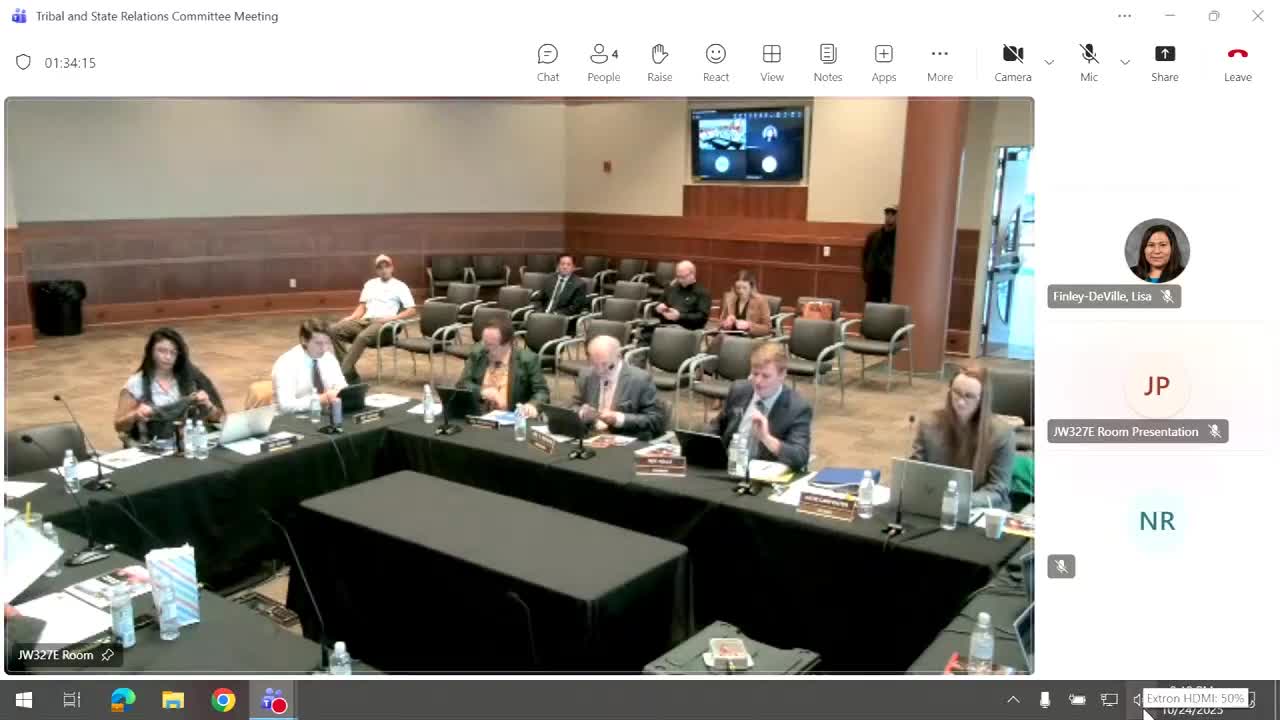MHA Nation asks state for hospital, addiction-treatment support, water protections and joint law-enforcement protocols
Get AI-powered insights, summaries, and transcripts
Subscribe
Summary
MHA Nation leaders briefed the Legislative Tribal‑State Relations Committee on long-term harms from land loss and federal policies, and asked the state to help with a hospital and ER, addiction-treatment waivers, water protections and coordinated public-safety response.
Chairmen and members of the Legislative Tribal‑State Relations Committee met with leaders of the Mandan, Hidatsa and Arikara (MHA) Nation at Fort Berthold, where tribal officials outlined a portfolio of public‑health, infrastructure and natural‑resource needs and asked for clearer state‑tribal cooperation.
The MHA Nation’s chairman described a long history of land loss and federal policies that reduced the tribe’s historic territory and argued the tribe needs state support to expand local hospital and emergency services, broaden addiction treatment and coordinate law enforcement and emergency response across jurisdictional lines.
The request centers on immediate health‑care gaps. Councilwoman Monica Mayer, a physician and member of the MHA council, said the reservation lacks a hospital and emergency room despite serving a population with “a life expectancy on this reservation for a man or a female [of] the average is 52 years of age,” and called that “20 years behind” national averages. She said the tribe is investing in a medical campus and wants to develop a hospital and nursing facility to serve tribal and nontribal residents and oil‑field workers who now must travel long distances for emergency care.
Chairman Fox framed addiction treatment as an urgent, costly public‑health and public‑safety issue. “Pay now or pay later,” he told committee members, arguing the nation is choosing earlier, local investment in treatment rather than paying larger social costs later. Fox said a major barrier is the federal Medicaid limitation known as the IMD (institutions for mental disease) exclusion that prevents Medicaid reimbursement for residential treatment facilities with more than 16 beds unless a waiver is granted by state and federal officials; he and tribal health leaders urged state support for a waiver so the tribe’s residential program can expand.
Justin Shook, executive director of Good Road Recovery Center, and Dr. Joy Fralick, director of MHA recovery services, described the tribe’s treatment continuum—hotline, social detox, residential treatment, women’s and children’s services and sober living—and the constraints the IMD rule places on serving more patients locally. Dr. Fralick said the tribe’s residential and transitional programs are an important pathway for relatives who otherwise must travel out of state for care.
Leaders also pressed the committee on public‑safety cooperation and drug enforcement. Chairman Fox said the nation wants formalized protocols so tribal, state and federal authorities coordinate arrests and prosecutions when crimes occur on or across reservation boundaries. He described an ongoing “drug war” on the reservation and said coordinated enforcement and prosecution would reduce criminal markets that profit from addiction.
Water and natural‑resource protection was another priority. Chairman Fox warned against unregulated withdrawals from the Fox Hills aquifer and said the tribe passed a water code to protect aquifers and surface supplies. He told the committee that hydrologists warned a one‑inch recharge in that aquifer takes many years, and that a several‑foot drop in pressure is effectively irreversible on human timescales. He urged the state and federal partners to coordinate on permitting and enforcement to avoid permanent declines in groundwater and harm to reservation water systems.
Energy and economic development were raised throughout the presentation. Fox described the tribe’s strategy to expand oil and gas storage, gas capture and LNG projects, and to seed data‑center investment using local water, cooling and gas resources. He warned that federal processing delays—probate backlogs and understaffed BIA offices—delay lease, royalty and rights processing and create hardship for allottee families.
Gaming and local revenue losses were also addressed. Fox and Councilwoman Mayer said gaming expansion elsewhere and new machines reduced the tribe’s casino revenue and employment by roughly half, and that the tribe is investing in new hotel, convention and destination amenities to rebuild its customer base.
The MHA delegation closed by asking the committee to support jointly developed solutions—state backing for IMD waivers and other Medicaid changes; more consistent mutual aid and MOUs for emergency response and law enforcement; improved data and transparency on trust vs. non‑trust tax/royalty accounting; and state support for water‑protection measures.
The Legislative Tribal‑State Relations Committee agreed to consider the requests and later voted to ask legislative staff to draft a bill related to the IMD waiver (see related article). Members said they would convene with legislative council staff to draft language and invite tribal leaders to review the proposal at the committee’s next interim meeting.
The tribal presentations included detailed program descriptions, requests for intergovernmental MOUs and examples of federal policy effects—probate delays and BIA understaffing—that complicate tribal administration and individual allottee payments. Tribal leaders asked the state to coordinate with the tribe to address those federal bottlenecks and to consider collaborative investments—such as emergency‑response funds, shared HAZMAT capacity and support for cultural and community centers—that tribal leaders say produce measurable community benefits.
